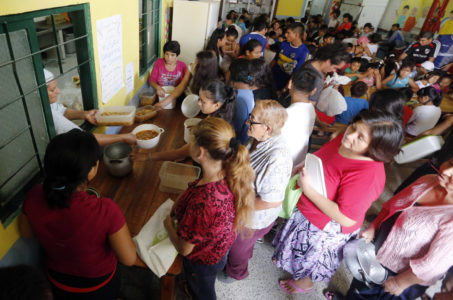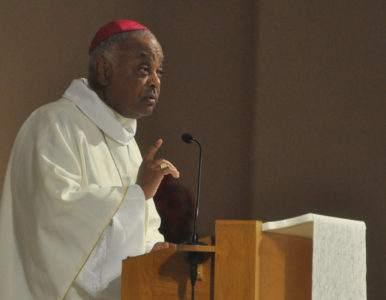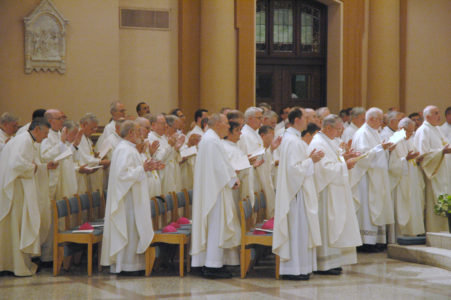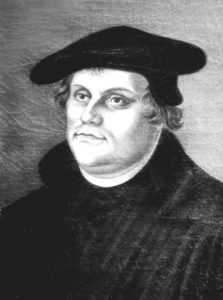By Carol Glatz
CIUDAD DEL VATICANO (CNS) – La gente no debe ser indiferente, ni faltar de responder ante la creciente pobreza en el mundo mientras una minoría privilegiada acumula “riqueza ostentosa”, dijo el papa Francisco.
Dios creó el cielo y la tierra para todos; son los hombres, por desgracia, quienes han levantado fronteras, muros y vallas, traicionando el don original destinado a la humanidad sin exclusión alguna,” dijo el papa en un mensaje para la primera Jornada Mundial de los Pobres.
La recién establecida conmemoración y el periodo de reflexión y acción que sigue tienen el propósito de ayudar a los cristianos a desarrollar y mantener un estilo de vida más consistente y sincero cimentado en el compartir, en la simplicidad, y las verdades esenciales del Evangelio, dijo el papa en un mensaje emitido el 13 de junio, día de la fiesta de San Antonio de Padua.

People receive food rations in 2014 at a community soup kitchen in a Buenos Aires, Argentina. World Day of the Poor, to be celebrated Nov. 19 this year, will focus on the apostle John’s call to love “not with words, but with deeds.” (CNS photo/Enrique Marcarian, Reuters) See POPE-POOR-MESSAGE June 13, 2017.
La Jornada Mundial de los Pobres, que será observada cada año el domingo 33 del tiempo ordinario, se observará este año el 19 de noviembre y se enfocará en el llamado del apóstol Juan de amar “no de palabra, sino con obras”.
Hay muchas formas de pobreza material y espiritual que envenenan los corazones de la gente y perjudican su dignidad, dijo el papa en su mensaje, y “se debe responder con una nueva visión de la vida y de la sociedad”. Muy a menudo los cristianos han asumido una “mentalidad mundana” y han olvidado mantener su vista y sus metas enfocadas en Cristo, quien está presente en los que son frágiles y vulnerables.
“La pobreza tiene el rostro de mujeres, hombres y niños explotados por viles intereses, pisoteados por la lógica perversa del poder y el dinero”, él dijo. “Qué lista inacabable y cruel nos resulta cuando consideramos la pobreza como fruto de la injusticia social, la miseria moral, la codicia de unos pocos y la indiferencia generalizada”.
“Hoy en día, desafortunadamente, mientras emerge cada vez más la riqueza descarada que se acumula en las manos de unos pocos privilegiados, con frecuencia acompañada de la ilegalidad y la explotación ofensiva de la dignidad humana, escandaliza la propagación de la pobreza en grandes sectores de la sociedad entera”, dijo el papa. “Ante este escenario, no se puede permanecer inactivos, ni tampoco resignados”.
Los cristianos tienen que acercarse a los pobres como Cristo lo hizo y mandó, dijo el papa. Los pobres, de hecho, “no son un problema, sino un recurso” rico en dignidad y en los dones dados por Dios que pueden ayudar a los cristianos a entender la verdad esencial del Evangelio. “Si deseamos ofrecer nuestra aportación efectiva al cambio de la historia, generando un desarrollo real, es necesario que escuchemos el grito de los pobres y nos comprometamos a sacarlos de su situación de marginación”, escribió el papa en su mensaje.
Días antes que terminara el Jubileo Extraordinario de la Misericordia, el papa Francisco habló de su deseo de tener un día especial dedicado a los pobres.
El arzobispo Rino Fisichella, presidente del Pontificio Consejo para la Promoción de la Nueva Evangelización, le dijo a reporteros que el papa veía el día como una manera para que toda la iglesia piense en el sentido de la pobreza del Evangelio – buscando y recibiendo solamente lo esencial – y entonces actúe y comparta concretamente el tesoro esencial del amor y la misericordia de Dios.
Las iglesias locales deben dedicar la semana antes de la Jornada Mundial de los Pobres a iniciativas creativas que fomenten el encuentro, la amistad, la solidaridad y la ayuda concreta, dice el mensaje del papa. El consejo pontificio publicará en septiembre una guía pastoral para ayudar a las parroquias en su planificación, dijo el arzobispo.
El papa celebrará Misa en la Basílica de San Pedro el 19 de noviembre con los pobres y los voluntarios y después ofrecerá almuerzo para “por lo menos 500 pobres” en la sala de audiencias Pablo VI del Vaticano, dijo el arzobispo Fisichella, añadiendo que muchas iglesias y organizaciones católicas de Roma estarían ofreciendo gestos similares de una comida compartida.



